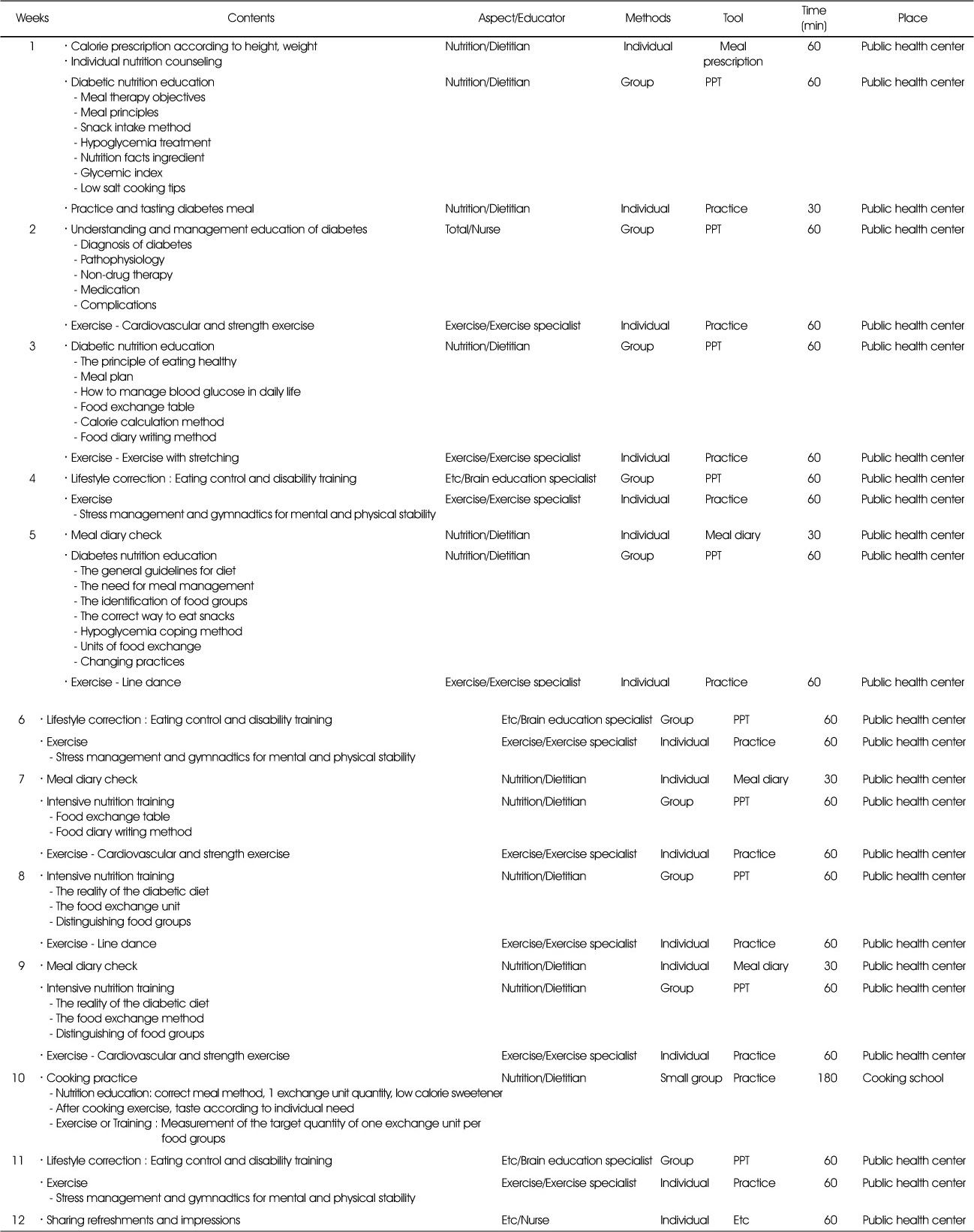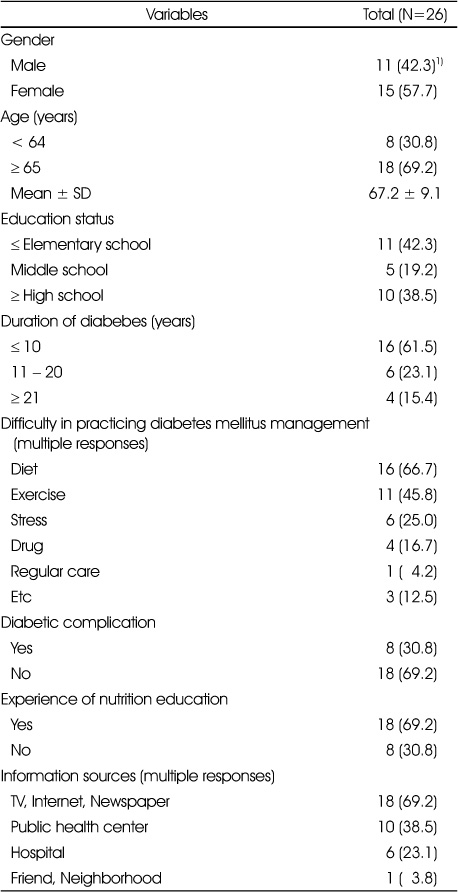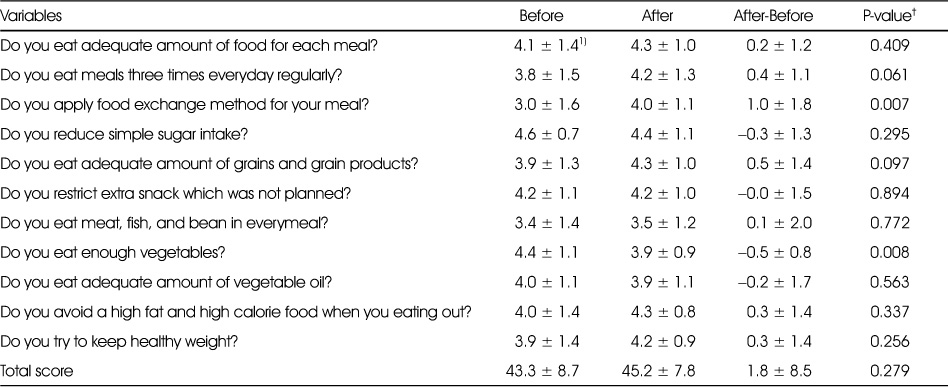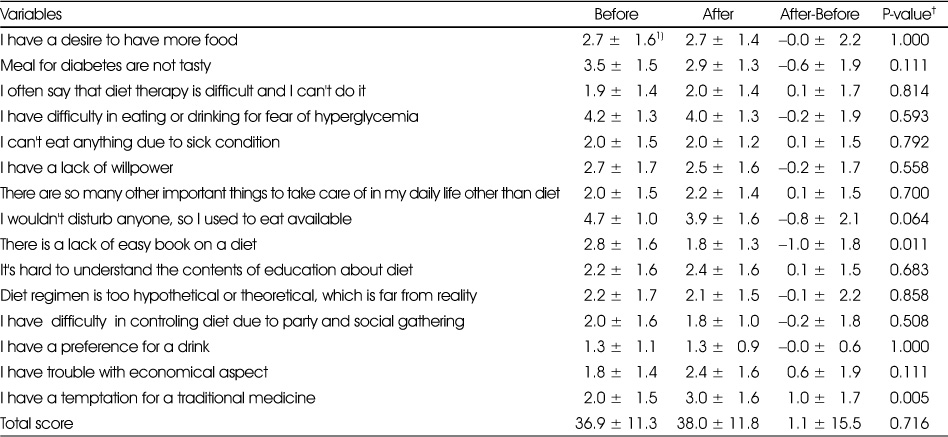References
1. Cho KO. A comparative study assessing metabolic profile and diet quality in college women according to their mother's diabetes mellitus. J Korean Diet Assoc 2009;15(1):1–9.
2. Park YS, Lee JW, Seo JS, Lee BK, Lee SH. Nutrition education and counseling 3th edth ed. Paju: Kyomunsa; 2011. p. 4–374.
4. Korean Diabetes Association. Diabetes fact sheet Seoul: Korean Diabetes Association; 2016.
6. Tuomilehto J, Lindstrom J, Eriksson JG, Valle TT, Hamalainen H, Ilanne-Parikka P. Prevention of type 2 diabetes mellitus by changes in lifestyle among subjects with impaired glucose tolerance. N Engl J Med 2001;344(18):1343–1350.
7. Boule NG, Haddad E, Kenny GP, Wells GA, Sigal RJ. Effects of exercise on glycemic control and body mass in type 2 diabetes mellitus: a meta-analysis of controlled clinical trial. JAMA 2001;286(10):1218–1227.
8. Song MS, Song KH, Ko SH, Ahn YB, Kim JS, Shin JH. The long-term effect of a structured diabetes program for uncontrolled type 2 diabetes mellitus patients - a 4-year follow-up. J Korean Diabetes Assoc 2005;29(2):140–150.
9. Lee JY, Kim CB. Direction of community health promotion in Korea. Korean J Health Promot 2000;2(1):3–12.
10. Kim SY, Kim SB. Effects of nutrition education at a community health center on overweight and obese middle-aged women in Jeonbuk area: Focused on personalized daily energy requirement and food exchange units. Korean J Community Nutr 2017;22(4):307–322.
11. Kim MJ, Kwon SJ, Lee SY. Effects of low glycemic index nutrition education on the blood glucose control in patients with type 2 diabetes mellitus. Korean J Nutr 2010;43(1):46–56.
12. Kang HJ, Sin EM, Kim KW. Evaluation of nutrition education for diabetes mellitus management of older adults. Korean J Community Nutr 2009;14(6):734–745.
13. Kim TY, Um SH, Kim WY, Chang NS. Group lunch visits are public health center improve glycemic control in older adults with type 2 diabetes mellitus. Korean J Nutr 2004;37(4):302–309.
14. Oh JY, Kim SB. Development and effects' analysis of nutrition education program for diabetes mellitus at community health center: Focused on individual daily energy requirements and food exchange units. Korean J Community Nutr 2010;15(4):485–497.
15. Lee YA, Kim KN, Chang NS. The effect of nutrition education on weight control and diet quality in middle-aged women. Korean J Nutr 2008;41(1):54–64.
16. Yim KS, Min YH, Lee TY. Evaluation of effect on nutrition counseling and nutrition education program at a public health center. J Korean Diet Assoc 1997;3(2):192–210.
17. Meloche J. Cooking with class: participation soars with hands-on learning and take-aways. J Nutr Educ Behav 2003;35(2):107–108.
18. Korean Diabetes Association. 2015 Treatment guideline for diabetes Seoul: Korean Diabetes Association; 2015. p. 2–147.
19. Kim TY, Um SH, Kim WH, Chang NS. Group lunch visits at the public health center improve glycemic control in older adults with type 2 diabetes mellitus. Korean J Nutr 2004;37(4):302–309.
20. An SY. Effect of intensive health management program on knowledge, self-care behaviors and glycemic control in diabetic patients [master's thesis] Chungju National University; 2011.
21. Norris SL, Lau J, Smith SJ, Schmid CH, Engelgau MM. Self-management education for adults with type 2 diabetes: a meta-analysis of the effect on glycemic control. Diabetes Care 2002;25(7):1159–1171.
22. Korean Diabetes Association. Glycosiatrics 3th edth ed. Seoul: Golyeouihag; 2005. p. 189–190.
23. Kim TY. Group lunch visits at the public health center improve glycemic control in older adults with type 2 diabetes mellitus [master's thesis] Ewha Womans University; 2003.
24. Shim WS, Hong SB, Choi YS, Choi YJ, Ahn SH, Min KY. Development of two parallel diabetes knowledge tests. J Korean Diabetes Assoc 2006;30(6):476–486.
26. Kwon YW. Development and validation of an evaluation instrument to measure diabetic patients' compliance with diet therapy [master's thesis] Seoul National University; 2009.
27. Park Y, Park HH, Ryu SY. Factors associated with active participation in health promotion programs at a public health center. J Agric Med Community Health 2010;35(3):287–300.
28. Son SM, Kim HJ. Effect of 12-week low calorie diet and behavior modification on the anthropomeric indices and biochemical nutritional status of obese women. Korean J Community Nutr 2005;10(4):525–535.
29. Shin EY, Kim CH, Yoo WS, Kim HG, Kim CY. The effect of case management program for diabetic patients in Korean community. J Korean Community Nurs 2003;14(4):559–567.
30. Koproski J, Pretto Z, Poretsky L. Effect of an intervention by a diabetes team in hospitalized patients with diabetes. Diabetes Care 1997;20(10):1553–1555.
31. Engelgau MM, Thompson TJ, Herman WH, Boyle JP, Aubert RE, Kenny SJ. Comparison of fasting and 2-hour glucose and HbA1c levels for diagnosing diabetes: diagnostic criteria and performance revisited. Diabetes Care 1997;20(5):785–791.
32. Lowe LP, Liu K, Greenland P, Metzger BE, Dyer AR, Stamler J. Diabetes, asymptomatic hyperglycemia, and 22-year mortality in black and white men: the Chicago Heart Association Detection Project in Industry Study. Diabetes Care 1997;20(2):163–169.
33. Hanefeld M, Fischer S, Julius U, Schulze J, Schwanebeck U, Schnechel H. Risk factors for myocardial infarction and death in newly detected NIDDM: the Diabetes Intervention Study, 11-year follow-up. Diabetologia 1996;39(12):1577–1583.
34. Kim JH, Chang SA. Effect of diabetes education program on glycemic control and self management for patients with type 2 diabetes mellitus. Korean Diabetes J 2009;33(6):518–525.
35. Koev DJ, Tankova TI, Kozlovski PG. Effect of structured group education on glycemic control and hypoglycemia in insulin-treated patient. Diabetes Care 2003;26(1):251.
36. Moon SJ, Shon CY, Kim JH, Kim HS, Lim HS, Lee HC. Measurement of nutrition counseling effects for diabetes mellitus patients. Korean J Nutr 1994;27(10):1070–1077.
37. Kim MJ, Kwon SJ, Ly SY. Effect of low glycemic index nutrition education on the blood glucose control in patients with type 2 diabetes mellitus. Korean J Nutr 2010;43(1):46–56.
38. Lee MR, Song MS. Long term effects of a self-care education program promoting self-efficacy for elderly people with diabetes. J Korean Gerontol Nurs 2003;5(1):91–101.
39. Howe CJ, Jaward AF, Tuttle AK, Moser JT, Peris C, Buzby M. Education and telephone case management for children with type 1 diabetes: a randomized controlled trial. J Pediatr Nurs 2005;20(2):83–95.
40. Kang HJ, Shin EM, Kim KW. Evaluation of nutrition education for diabetes mellitus management of older adults. Korean J Community Nutr 2009;14(6):734–745.
41. Yang SO, Ahn SY, Yim ES, Kwon MS. The effects of customized home visiting health service in Gangwon-do: Focused on hypertension and DM clients. J Korean Acad Community Health Nurs 2008;19(1):88–100.
42. Seo HJ, Jung MS, Park GH. Diabetic knowledge, perceived stress, response patterns of health locus of control and sick-role behavior compliance in diabetic patients. J Kyungpook Nurs Sci 2003;7(2):1–18.
43. Kim YS, Seung JJ, Kim DM, Kim SB, Yoo HJ. A study on the evaluation of diet-education program of diabetes. Diabetes Metab J 1986;10(2):191–195.
44. Olson JC, Sims LS. Assessing nutrition knowledge from an information processing perspective. J Nutr Educ 1980;12(3):157–161.
45. Korean Diabetes Association. Diabetes fact sheet Seoul: Korean Diabetes Association; 2013.
46. McCulloch DK, Mitchell RD, Ambler J, Tattersall RB. Influence of imaginative teaching of diet on compliance and metabolic in insulin dependent diabetes. Br Med J 1983;287(6408):1858–1861.








